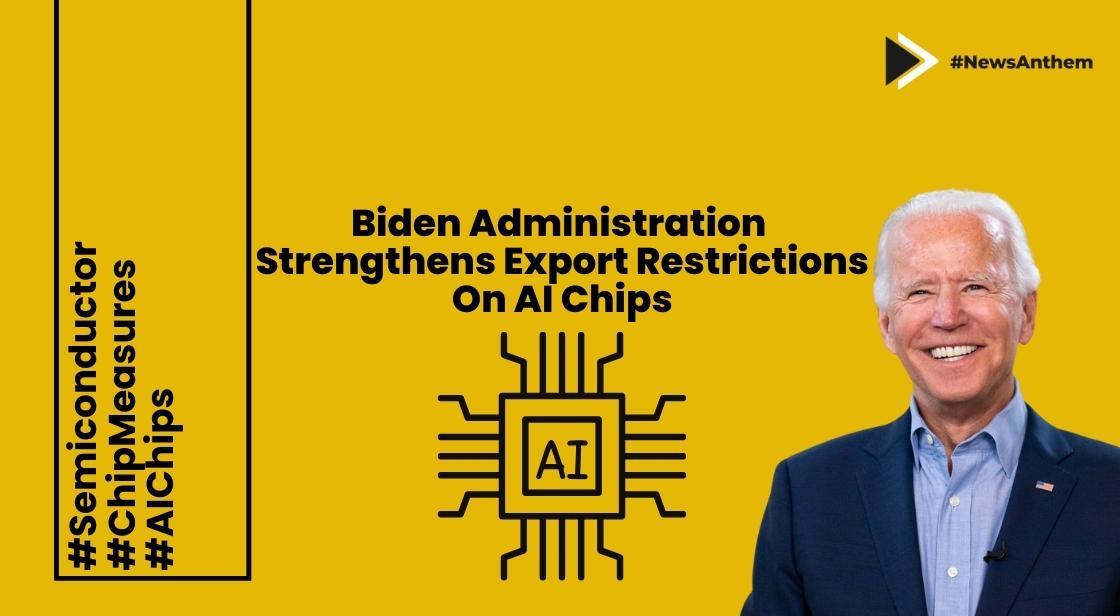Biden Administration Strengthens Export Restrictions on AI Chips

News Synopsis
In a significant move, the Biden administration has unveiled a set of measures aimed at restricting the export of advanced artificial intelligence (AI) chips and chipmaking tools. The primary objective is to prevent China from acquiring cutting-edge U.S. technologies, particularly for military applications.
The Biden administration has introduced new measures to curb the export of advanced AI chips, extending restrictions to impede China's access to crucial U.S. technologies. This development underscores the administration's efforts to address national security concerns and prevent the enhancement of China's military capabilities through advanced semiconductor technologies.
Wider Restrictions and Blacklisting:
Scheduled to take effect in 30 days, the new measures extend restrictions to a broader array of countries, including Iran and Russia. Notably, Chinese chip designers Moore Threads and Biren find themselves on the trade blacklist. The blacklisting underscores the administration's commitment to limiting China's access to advanced semiconductors with potential military applications.
Commerce Department's Perspective:
Commerce Department Secretary Gina Raimondo emphasized the goal of limiting China's access to advanced semiconductors critical to military applications. The administration aims to prevent breakthroughs in artificial intelligence that could contribute to the strengthening of Chinese military capabilities.
Raimondo clarified that the intention is not to harm China's economy, highlighting the continued import of semiconductors worth billions of dollars from the U.S.
Chinese Embassy's Response:
The Chinese embassy expressed firm opposition to the new restrictions, asserting that they violate principles of fair competition and undermine international economic and trading order. Tensions rise as the U.S. takes measures to protect its technological edge while China opposes what it perceives as unfair restrictions.
Challenges in Restricting Advanced Chips:
The release of these measures highlights the challenges faced by the Biden administration in restricting the flow of advanced chips into China. Concerns grow over the role of U.S. technology in contributing to the advancement of China's military capabilities.
Impact on U.S. Chipmakers:
The semiconductor industry, including major players like Nvidia, Intel, and AMD, is closely monitoring the impact of these regulations. While exemptions exist for consumer chips used in devices like laptops and smartphones, certain chips will be subjected to licensing and notification requirements by U.S. officials. Nvidia's shares fell, reflecting concerns about potential challenges in the long term.
Technological Workarounds and New Regulations:
The previous regulations employed a two-pronged test, evaluating both computing performance and communication capabilities. The new regulations introduce limits on the computing power of chips to prevent workarounds. China's identification of "chiplet" technology as crucial to its semiconductor industry's future is also addressed.
Impact on Chinese Startups:
Chinese startups Biren and Moore Threads, founded by former Nvidia employees, are directly impacted. They will face rigorous licensing requirements, with Biren expressing opposition to blacklisting and Moore Threads strongly disagreeing with its addition to the trade blacklist.
Expansion of Licensing Requirements:
The new measures expand licensing requirements for exports of advanced chips to over 40 additional countries, particularly those presenting risks of diversion to China. Additionally, licensing requirements for chipmaking tools are applied to 21 countries outside China, reflecting concerns about potential equipment diversion to China and other national security considerations.
Semiconductor Industry's Response:
The Semiconductor Industry Association emphasizes the importance of working with allies, suggesting that broad, unilateral controls could potentially harm the U.S. semiconductor ecosystem without significantly advancing national security.









